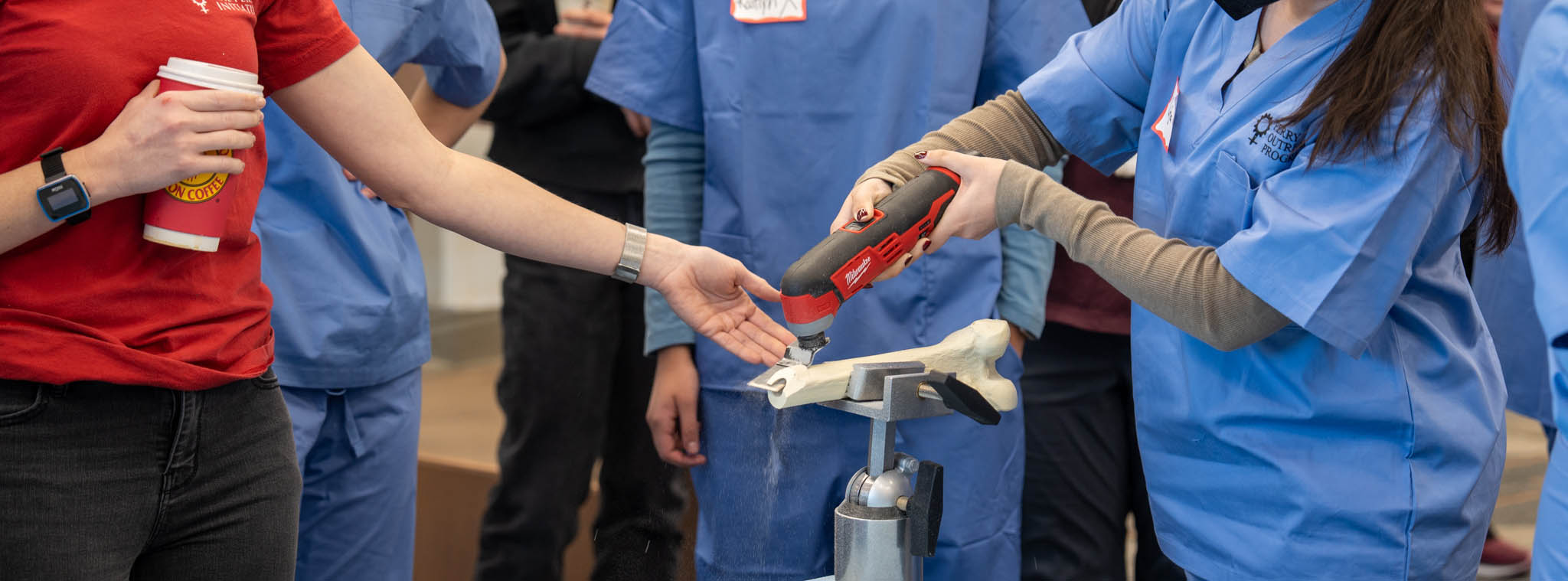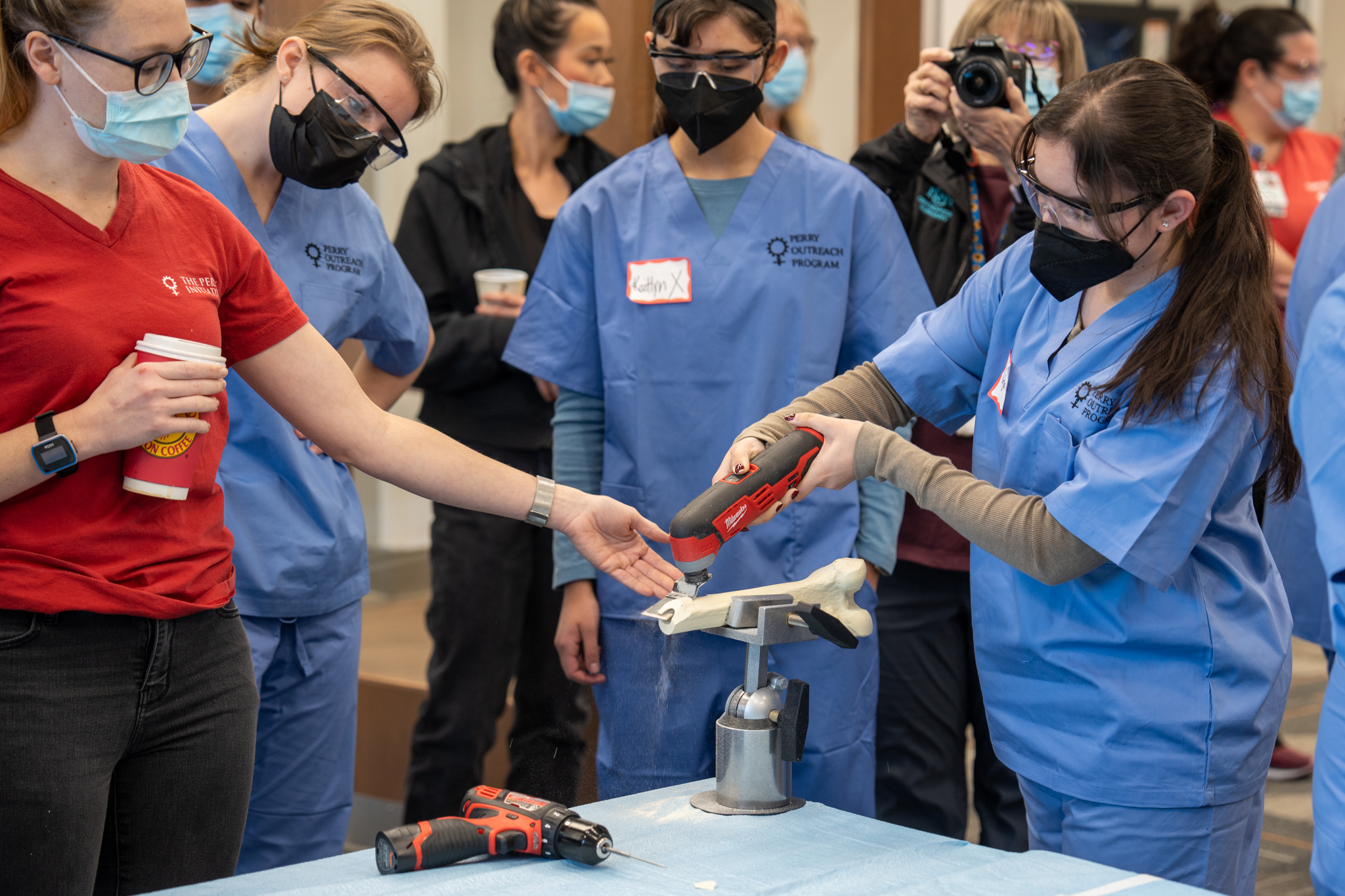Drills whirred and saws buzzed throughout The University of New Mexico Center of Excellence for Orthopaedic Surgery & Rehabilitation during an event designed to encourage more female and non-binary high school students to consider pursing orthopedic surgery or mechanical engineering.
On Saturday, April 1, student participants had a chance to perform mock orthopedic surgeries, conduct biomechanical engineering experiments and practice applying plaster arm casts.
“We essentially immerse them in the day of the life of an orthopedic surgeon or a mechanical engineer,” said Christina Salas, PhD, MSc, an associate professor in the UNM Department of Orthopaedics & Rehabilitation with a joint appointment in the Department of Mechanical Engineering. “They’re performing mock surgeries using the actual synthetic bones that are used by our orthopedic residents who are in training.”
The free one-day hands-on experience was somewhat competitive, as only 40 applicants were accepted.
“The group that we have today are 9th through 12th graders, and we have them using saws and drills and real orthopedic equipment,” said Deana Mercer, MD, an orthopedic surgeon who helped with the event. “The goal is to stimulate some interest in this field.”
Orthopedic surgery lags behind other surgical specialties in terms of reaching gender equality, and women remain underrepresented in the field, Mercer said.
The reason for this disparity is multifaceted, with lack of exposure and mentorship frequently cited as two key reasons women decide not to choose orthopedic surgery as a specialty.
In recognition of these gender differences, The Perry Initiative was founded to increase young women’s exposure to the field, provide mentorship opportunities and recruit women and those who identify as non-binary into orthopedic surgery and related engineering fields.
When you have the opportunity to encourage young women to enter fields that are a little bit outside of their comfort zone, because this definitely is, you should do that. Encouraging young women to enter fields of medicine, engineering, math – even if they don’t choose to go that route, it empowers them
“When you have the opportunity to encourage young women to enter fields that are a little bit outside of their comfort zone – because this definitely is – you should do that,” Mercer said. “Encouraging young women to enter fields of medicine, engineering, math – even if they don’t choose to go that route, it empowers them.”
Those who apply must gender-identify as female or nonbinary and be in high school. Preference is given to older students, Salas said.
“We hope that these day-long activities we host allows them to work with hand tools and feel comfortable doing so in an environment where there’s other people that look like them,” Salas said. “It’s a very exciting program.”
Participant Erika Eaton, a junior at Albuquerque High School, said she originally got interested in pursuing a career in medicine at a young age when she participated in regional and state anatomy and physiology competitions.
“Early on, I realized that orthopedic surgery is something that I really love,” she said.
Naturally, the Perry Initiative program was right up her alley.
“Coming in, I was definitely a little nervous, but also super excited,” she said. “This is a totally amazing opportunity for me to make connections with people and have resources I can lean on when I’m working my way up in the medical field.”
The Perry Initiative, which was named in honor of orthopedic surgeon Jacquelin Perry (1918-2013), partners with medical centers, universities and high schools to host Perry Outreach Programs. The day-long programs are held at over 45 locations nationwide throughout the year.
Salas said the Perry Initiative Program has been hosted at UNM for 10 years. In that time, she said several participants who have pursued orthopedic and engineering educations and careers have reflected on their time with the program and how it helped them.
“Not only do I get emails and letters from prior participants, but I’ll hear from students who participated who are interested in doing volunteer work in my lab or shadowing,” Salas said. “It’s important to start early. Life is about solving problems, and we want to encourage them to be problem solvers.”

